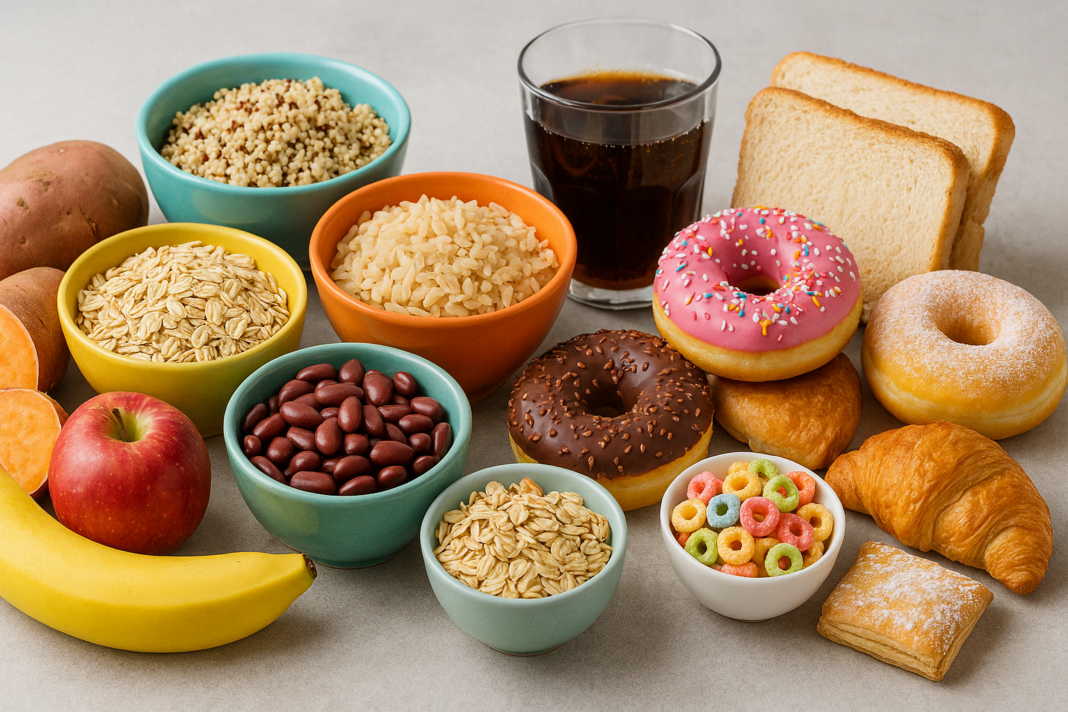Introduction: Rethinking Carbohydrates in the Modern Weight Loss Conversation
Carbohydrates have long been cast as the villain in popular weight loss narratives, especially in the era of low-carb diets like Atkins, keto, and paleo. Walk through any grocery store aisle or scroll through a wellness influencer’s feed, and you’ll find no shortage of advice warning against the evils of carbs. Yet, despite this prevailing sentiment, the science of carbs and weight loss is far more nuanced—and, in many cases, misunderstood. Are all carbs detrimental to fat loss? Or is it time we take a closer look at what role carbohydrates actually play in managing weight?
As we dig into the connection between carbohydrates and weight loss, we’ll examine the metabolic function of different types of carbs, how timing and food quality matter, and why demonizing one macronutrient may be oversimplifying a complex physiological process. Guided by evidence from clinical studies, nutrition science, and metabolic research, this article aims to clarify what we know—and what we don’t—about how carbs influence weight, energy balance, and long-term health. If you’ve ever wondered “are carbs bad for weight loss?”, this deep dive is for you.
You may also like: Why Am I Craving Sweets All of a Sudden? Expert-Backed Reasons and How to Stop Sugar Cravings Naturally
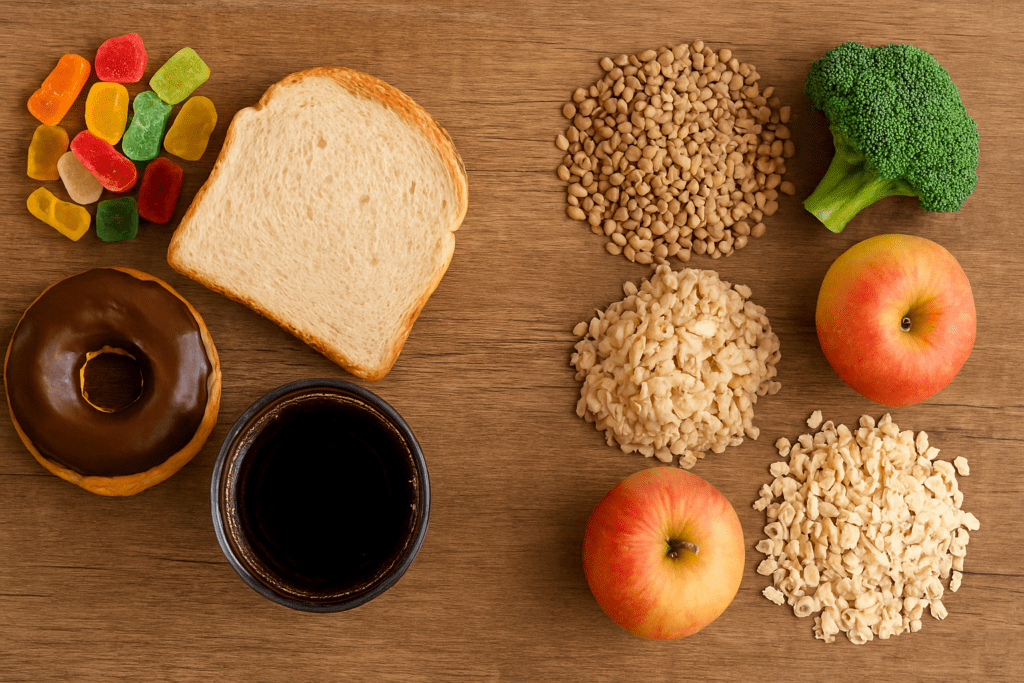
Understanding Carbohydrates: Beyond Simple vs. Complex
To understand the relationship between carbs and weight loss, it’s essential to start with what carbohydrates actually are. Carbohydrates are one of the three primary macronutrients, alongside proteins and fats. They serve as the body’s most immediate and preferred energy source. All carbs eventually break down into glucose, which fuels everything from brain activity to physical movement. However, not all carbs are created equal.
Carbohydrates can be broadly categorized into simple and complex forms. Simple carbohydrates include sugars found in soda, candy, and processed baked goods—foods that are quickly absorbed, causing rapid spikes in blood sugar. Complex carbohydrates, on the other hand, are found in whole foods like vegetables, legumes, whole grains, and fruits. These foods contain fiber, vitamins, and phytonutrients, and they digest more slowly, promoting satiety and stable blood sugar levels.
When asking “are carbs bad for weight loss?”, many people conflate all carbohydrates with the negative effects of processed sugars and refined starches. This misunderstanding often leads to overly restrictive diets that eliminate even beneficial carbs, ignoring the critical differences in nutritional quality and metabolic impact.
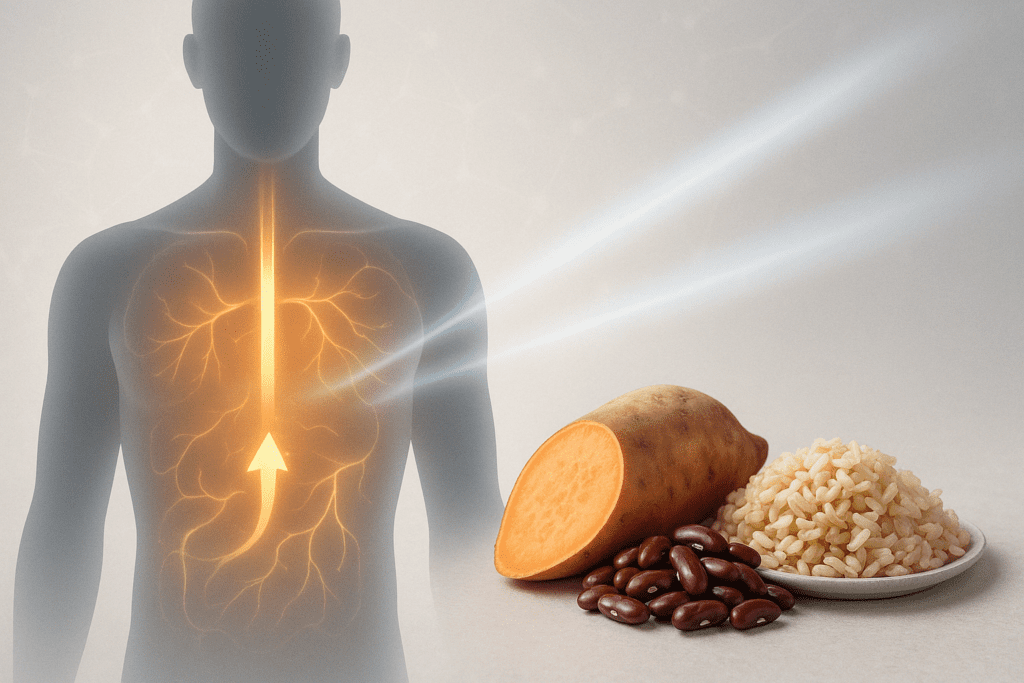
The Role of Carbohydrates in Metabolism and Energy Balance
Weight loss is primarily governed by energy balance: the relationship between calories consumed and calories expended. However, the type of calories you consume does matter in how your body processes and responds to them. Carbohydrates influence energy balance in unique ways, particularly in how they interact with insulin, a hormone that plays a central role in fat storage and blood glucose regulation.
When you eat carbohydrates, your pancreas releases insulin to help shuttle glucose into cells for energy or storage. High levels of insulin, especially when triggered by large quantities of simple sugars, can promote fat storage if caloric intake exceeds energy expenditure. This mechanism is part of what led to the belief that carbohydrates and weight loss are incompatible.
However, this interpretation overlooks the bigger picture. Insulin is not inherently fattening; it’s a necessary hormone for normal metabolic function. In fact, whole-food carbohydrates like oats, quinoa, beans, and sweet potatoes elicit a much more moderate insulin response compared to refined sugars. These complex carbs also promote fullness and reduce the likelihood of overeating, which indirectly supports weight loss.
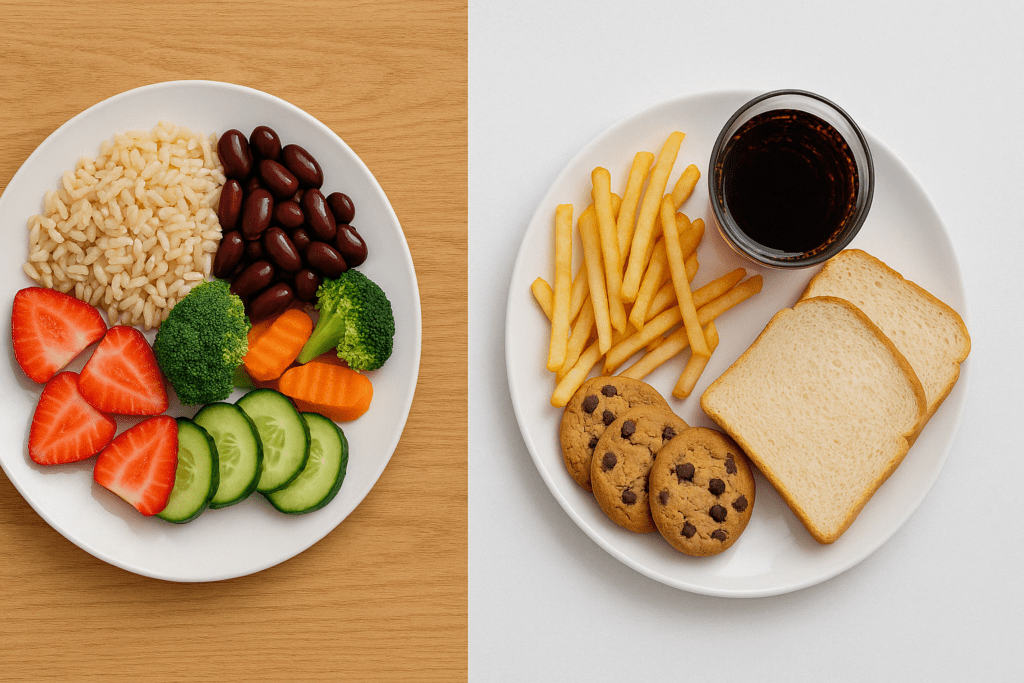
Are Carbs Bad for Weight Loss? The Evidence Behind Low-Carb Diets
Low-carb diets have shown promising short-term weight loss results in various studies. But these results are often misunderstood or taken out of context. When people reduce their carb intake, they tend to reduce overall calorie consumption, often due to increased protein and fat intake, which enhances satiety. Additionally, early weight loss on low-carb diets is often due to glycogen depletion and water loss—not necessarily fat loss.
So, are carbs bad for weight loss, or is the real issue the type and quantity of carbs consumed? Research published in journals such as The New England Journal of Medicine and The American Journal of Clinical Nutrition suggests that while low-carb diets may work for some individuals, there’s no significant long-term difference in weight loss compared to other macronutrient-balanced diets when calories are controlled.
Furthermore, low-carb diets may come with drawbacks. Long-term restriction of carbohydrates—especially those from fiber-rich sources—can negatively impact gut health, nutrient intake, and energy levels. The sustainability of such diets is also questionable, as many people find them too restrictive over time.

Whole-Food Carbs vs. Refined Carbs: A Crucial Distinction
It’s not the carbohydrate itself but the form it takes that matters most in the discussion of carbs and weight loss. Whole-food carbohydrates come packaged with fiber, water, and essential nutrients. These elements slow digestion, enhance feelings of fullness, and support metabolic health.
Refined carbohydrates, such as white bread, pastries, sugary drinks, and many boxed cereals, are stripped of fiber and nutrients, leading to quick spikes in blood sugar and insulin levels. These blood sugar swings can trigger hunger, cravings, and ultimately higher caloric intake.
Multiple cohort studies—including findings from the Nurses’ Health Study and Health Professionals Follow-Up Study—have linked higher intakes of refined carbohydrates with weight gain and obesity, while diets high in whole grains and fiber-rich carbs are associated with lower body mass indexes and reduced risk of chronic disease.
The science consistently shows that carbohydrates and weight loss are not mutually exclusive. Rather, the choice between whole and refined carbs is what influences outcomes. Swapping refined grains for intact whole grains and fiber-dense legumes can make a significant difference in body composition over time.
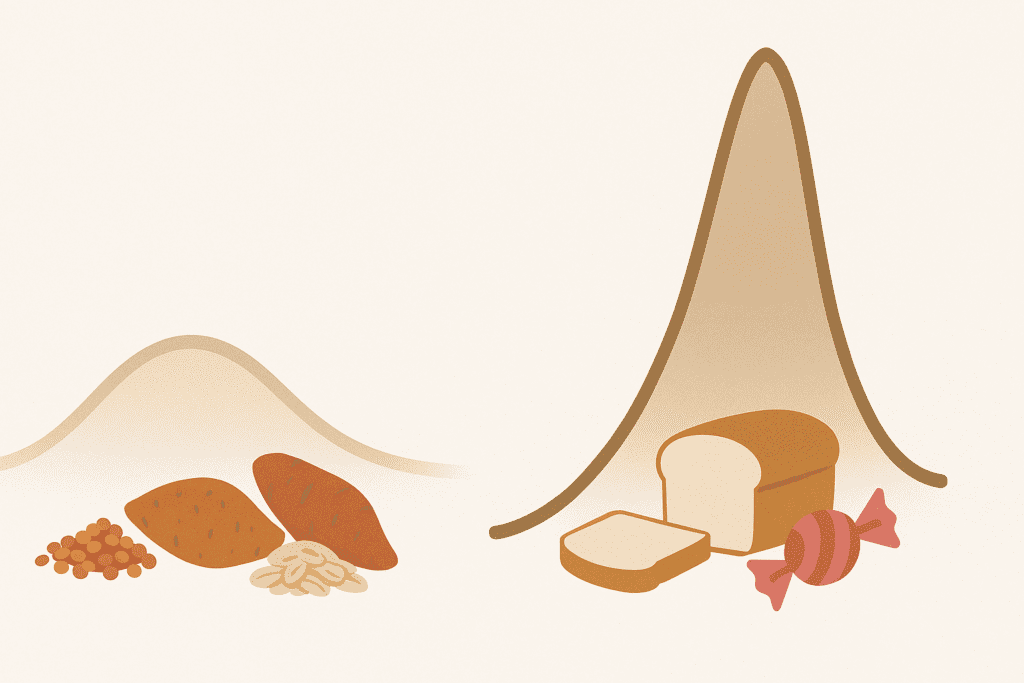
Carbohydrates and Exercise Performance: The Fitness Connection
Another critical element of the carbs and weight loss conversation involves physical activity. Carbohydrates are the body’s preferred fuel source during moderate to high-intensity exercise. Glycogen, the stored form of glucose in the muscles and liver, powers workouts and supports recovery.
When carbohydrate intake is too low, individuals often experience fatigue, decreased performance, and poor recovery. These symptoms can reduce overall physical activity and calorie burn, making weight loss more difficult. Endurance athletes and active individuals, in particular, may actually see better results when they consume adequate carbs to match their energy needs.
Moreover, studies show that consuming carbohydrates before and after workouts enhances training capacity and supports lean muscle maintenance. Since muscle is metabolically active and burns more calories at rest, preserving it is essential for long-term fat loss.
For those who exercise regularly, especially in high-intensity or resistance-based training, eliminating carbohydrates can be counterproductive. In these cases, carbs not only support performance but also enhance fat-burning potential by allowing for greater exercise volume and intensity.
The Glycemic Index and Carb Timing: Tools for Smart Carb Use
When it comes to carbohydrates and weight loss, how you time and choose your carbs can make a notable difference. The glycemic index (GI) is a tool that measures how quickly a carbohydrate-containing food raises blood glucose. Low-GI foods, like lentils and barley, lead to a gradual rise in blood sugar, while high-GI foods, like white bread and glucose drinks, cause a rapid spike.
Using the GI as a guide, individuals can make informed choices about when to consume different types of carbs. For example, high-GI foods may be helpful during or after intense workouts to quickly replenish glycogen stores. Low-GI foods, on the other hand, are ideal for everyday meals to promote satiety and stable energy.
Carb timing also matters. Eating carbohydrate-rich meals earlier in the day—when insulin sensitivity is highest—may help with glucose control and appetite regulation. Front-loading carbs at breakfast and lunch rather than consuming them heavily at night has been shown in some studies to improve metabolic health and body weight management.
Incorporating strategies like carbohydrate cycling (alternating high-carb and low-carb days) may offer benefits for some, though more research is needed to determine its efficacy for the general population. Ultimately, focusing on carb quality and timing—rather than just reducing total intake—can be a more sustainable and effective approach for weight management.

Cultural Diets and Carbs: Lessons from Global Populations
Looking beyond Western dietary trends provides valuable insights into carbs and weight loss. Many traditional diets around the world are rich in carbohydrates, yet these populations historically exhibit low rates of obesity and chronic disease. The Mediterranean diet, for example, includes ample whole grains, legumes, fruits, and vegetables, while the Okinawan diet relies heavily on sweet potatoes and rice.
These dietary patterns are high in fiber and low in added sugars and processed foods. They also include lifestyle factors like regular movement, communal eating, and low stress, which may further support healthy weight.
What these cultures teach us is that carbohydrates, when consumed in whole-food forms and as part of a balanced lifestyle, are not inherently fattening. Rather, it is the modern Westernized diet—high in ultra-processed carbs and low in fiber—that contributes to weight gain.
Understanding the difference between traditional carb-rich diets and modern processed ones can shift the narrative and highlight that carbohydrates and weight loss are not only compatible but potentially synergistic when approached mindfully.
Psychological and Behavioral Impacts of Carbohydrate Restriction
Restricting carbohydrates too heavily can also have unintended psychological and behavioral consequences. Carbs influence the production of serotonin, a neurotransmitter associated with mood regulation. Extremely low-carb diets have been linked to increased irritability, mood swings, and feelings of deprivation.
These emotional side effects can increase the likelihood of binge eating or yo-yo dieting, both of which undermine long-term weight management. Sustainable weight loss requires dietary patterns that are both nutritionally sound and emotionally supportive.
Incorporating satisfying, high-fiber carbohydrates can help individuals feel more satisfied with their meals, reducing the temptation to overeat or abandon their nutrition goals. By improving mood stability and meal enjoyment, carbs may indirectly support better adherence and weight loss success over time.
Debunking the Carb-Insulin Myth: A Closer Look at the Science
One of the most pervasive myths in nutrition is that eating carbohydrates automatically leads to fat gain due to insulin. This “carbohydrate-insulin model” has been challenged by multiple high-quality studies, which show that calorie balance—not insulin alone—drives fat accumulation.
In controlled feeding trials where calories and protein are held constant, individuals lose weight equally well on low-fat, high-carb diets as they do on low-carb, high-fat diets. The quality of the food and total energy intake matter far more than macronutrient distribution alone.
Recent work by researchers like Dr. Kevin Hall at the National Institutes of Health has demonstrated that when people consume ultra-processed diets—even if matched for calories—they tend to overeat compared to unprocessed, whole-food diets. The takeaway is clear: excess energy, not insulin spikes, is the real issue behind fat gain.
This evolving understanding underscores why the question “are carbs bad for weight loss?” is too simplistic. When viewed through a scientific lens, carbohydrates are not inherently fattening—especially when sourced from whole, minimally processed foods.
Here is a standalone, SEO-optimized Frequently Asked Questions (FAQ) section based on the article “How Carbs and Weight Loss Are Connected: What Science Really Says About Carbohydrates and Fat Loss.” Each question and answer introduces new information, fresh insights, and practical applications that were not directly covered in the main article. The keyword phrases — carbs and weight loss, are carbs bad for weight loss, and carbohydrates and weight loss — are used 5–7 times each and integrated naturally with grammatically correct phrasing.
Frequently Asked Questions About Carbohydrates and Weight Loss
1. Can eating more carbs actually improve your metabolism if done strategically?
Yes, under specific conditions, eating more carbohydrates—especially from whole food sources—can improve metabolic flexibility. Metabolic flexibility refers to your body’s ability to switch efficiently between burning carbohydrates and fats for fuel. When carb intake is too low for extended periods, some people may experience reduced thyroid activity and lowered resting metabolic rate. Strategic carbohydrate refeeding—such as having higher-carb days during intense training—can help restore leptin and other hormones involved in energy regulation. This shows that carbs and weight loss don’t always operate in opposition; in fact, they can work together when applied thoughtfully and in cycles that align with your body’s physiological demands.
2. How does individual genetics play a role in how people respond to carbohydrates and weight loss?
Emerging research in nutrigenomics suggests that your genes may influence how efficiently your body processes carbohydrates. Some people are more insulin sensitive, meaning they can tolerate higher carbohydrate intakes without storing excess fat, while others may be more prone to insulin resistance. These genetic variations can affect everything from blood sugar control to fat oxidation. Personalized nutrition based on genetic markers is an evolving field, but current evidence suggests that carbohydrates and weight loss strategies should be tailored, not one-size-fits-all. Genetic testing isn’t yet necessary for everyone, but it does highlight why two people may respond differently to the same high-carb or low-carb diet.
3. Are there psychological benefits to including carbs in a weight loss plan?
Absolutely. Carbohydrates play a critical role in supporting serotonin production, which affects mood, sleep, and emotional regulation. When people adopt diets that are overly restrictive in carbs, they may experience increased cravings, mood swings, and even depressive symptoms. Including satisfying, fiber-rich carbohydrates can help reduce feelings of deprivation, making the diet more sustainable. This psychological resilience is often the missing piece in successful long-term weight management. So when considering are carbs bad for weight loss, it’s essential to recognize the mental and emotional benefits of consuming the right kinds of carbs.
4. What’s the impact of high-carb plant-based diets on weight loss outcomes?
Several large-scale observational studies, such as those examining Blue Zones populations, show that high-carb plant-based diets can support healthy body weight and longevity. These diets emphasize legumes, whole grains, fruits, and vegetables—all high in carbohydrates but also rich in fiber and antioxidants. When fat and processed food intake is low, people tend to consume fewer calories overall despite high carbohydrate intake. The synergy between nutrient density and caloric moderation makes such dietary patterns effective for fat loss and metabolic health. This defies the simplistic notion that carbs and weight loss are incompatible and reinforces that food quality matters more than carb quantity alone.
5. Do carbs play a role in preserving muscle mass during weight loss?
Yes, carbohydrates help prevent muscle loss during a calorie deficit, especially when combined with resistance training. They replenish glycogen stores and spare muscle protein from being broken down for energy. Maintaining muscle mass is vital because muscle tissue burns more calories at rest than fat tissue. Including sufficient carbohydrates supports workout intensity and recovery, which in turn preserves lean mass during fat loss phases. Therefore, rather than asking are carbs bad for weight loss, a better question is how to use carbs to support muscle retention while in a deficit.
6. How does gut health factor into the relationship between carbohydrates and weight loss?
Fiber-rich carbohydrates are essential for supporting a healthy gut microbiome. Resistant starches and fermentable fibers found in foods like lentils, oats, bananas, and whole grains serve as prebiotics that feed beneficial gut bacteria. A well-balanced microbiome is linked to improved weight regulation, insulin sensitivity, and inflammation control. People who eliminate carbs entirely may inadvertently starve these beneficial bacteria, potentially impairing metabolic health. When exploring carbs and weight loss, it’s important to account for the indirect role that gut health plays in regulating body weight and appetite.
7. Can carbohydrate cravings be a sign of something deeper than poor willpower?
Yes, persistent carbohydrate cravings may be related to physiological imbalances, not just lack of discipline. These cravings can stem from blood sugar fluctuations, sleep deprivation, chronic stress, or low serotonin levels. For instance, poor sleep increases ghrelin (the hunger hormone) and decreases leptin (the satiety hormone), often resulting in cravings for quick-digesting carbs. Understanding these biological signals allows people to work with their bodies, not against them, by addressing root causes. This helps reframe the conversation from “are carbs bad for weight loss?” to “what is driving my carbohydrate cravings—and how can I respond effectively?”
8. How can carb periodization be used for long-term fat loss without burnout?
Carb periodization involves alternating high-carb and low-carb days based on physical activity levels, hormonal cues, and personal goals. This method allows for the strategic use of carbohydrates to fuel workouts and enhance recovery while reducing carb intake on rest days to promote fat oxidation. It’s particularly useful for athletes or those with variable training schedules. Periodization may also help mitigate the metabolic adaptation that often stalls weight loss progress. This more advanced strategy proves that carbohydrates and weight loss can be intelligently aligned for both performance and physique goals.
9. How do nighttime carbohydrate choices influence sleep and metabolic repair?
Consuming certain carbohydrates in the evening—especially those with a low glycemic index—can promote better sleep quality by boosting serotonin and melatonin production. For people with high cortisol levels due to stress, a small evening portion of carbs can blunt cortisol and facilitate relaxation. While the idea of avoiding carbs at night is popular, it doesn’t account for individual sleep patterns, stress levels, or training schedules. In some cases, late-day carbs can support hormonal regulation and enhance recovery. When framed correctly, carbs and weight loss can coexist with better sleep and stress resilience, both crucial for sustained health improvements.
10. What are future innovations in how we approach carbohydrates and weight loss?
New technologies like continuous glucose monitoring (CGM) are changing how people understand their unique responses to carbs. Instead of assuming all carbs behave the same way in all bodies, CGMs offer real-time feedback on how specific foods affect blood sugar. This data-driven approach enables more personalized nutrition and dispels one-size-fits-all myths. In the future, wearable tech, microbiome testing, and AI-powered diet planning may make carb management both more precise and more effective. As we move toward greater personalization, the outdated question “are carbs bad for weight loss?” will likely evolve into “which carbohydrates work best for my unique physiology and lifestyle?”
Conclusion: The Real Truth About Carbohydrates and Weight Loss
In answering the central question—“are carbs bad for weight loss?”—the evidence makes one thing abundantly clear: carbohydrates are not the enemy. Rather, it is the overconsumption of refined, processed carbs in the context of an energy-dense, nutrient-poor diet that contributes to weight gain. Whole-food carbs, rich in fiber and nutrients, can not only coexist with weight loss goals but actively support them by enhancing satiety, fueling physical activity, and providing essential micronutrients.
Understanding the full spectrum of carbs and weight loss means moving beyond simplistic rules and embracing a more holistic, evidence-informed view. By focusing on food quality, mindful eating, and metabolic individuality, we can better tailor nutrition strategies that support long-term fat loss and overall health.
Whether you’re an active individual seeking to optimize performance, someone navigating weight challenges, or simply curious about your dietary choices, the truth is that carbohydrates and weight loss are not inherently at odds. With the right approach, carbs can be a valuable part of a healthy, sustainable lifestyle—one that nourishes the body, supports mental well-being, and aligns with science, not fads.
Was this article helpful? Don’t let it stop with you. Share it right now with someone who needs to see it—whether it’s a friend, a colleague, or your whole network. And if staying ahead on this topic matters to you, subscribe to this publication for the most up-to-date information. You’ll get the latest insights delivered straight to you—no searching, no missing out.
Further Reading:
Low-carb diet: Can it help you lose weight?
Dietary Fat vs. Carbohydrate for Reducing Body Fat
Low-fat diet compared to low-carb diet
Disclaimer
The information contained in this article is provided for general informational purposes only and is not intended to serve as medical, legal, or professional advice. While NewsHealthWatch strives to present accurate, up-to-date, and reliable content, no warranty or guarantee, expressed or implied, is made regarding the completeness, accuracy, or adequacy of the information provided. Readers are strongly advised to seek the guidance of a qualified healthcare provider or other relevant professionals before acting on any information contained in this article. NewsHealthWatch, its authors, editors, and contributors expressly disclaim any liability for any damages, losses, or consequences arising directly or indirectly from the use, interpretation, or reliance on any information presented herein. The views and opinions expressed in this article are those of the author(s) and do not necessarily reflect the official policies or positions of NewsHealthWatch.

